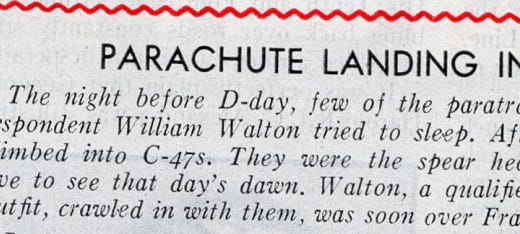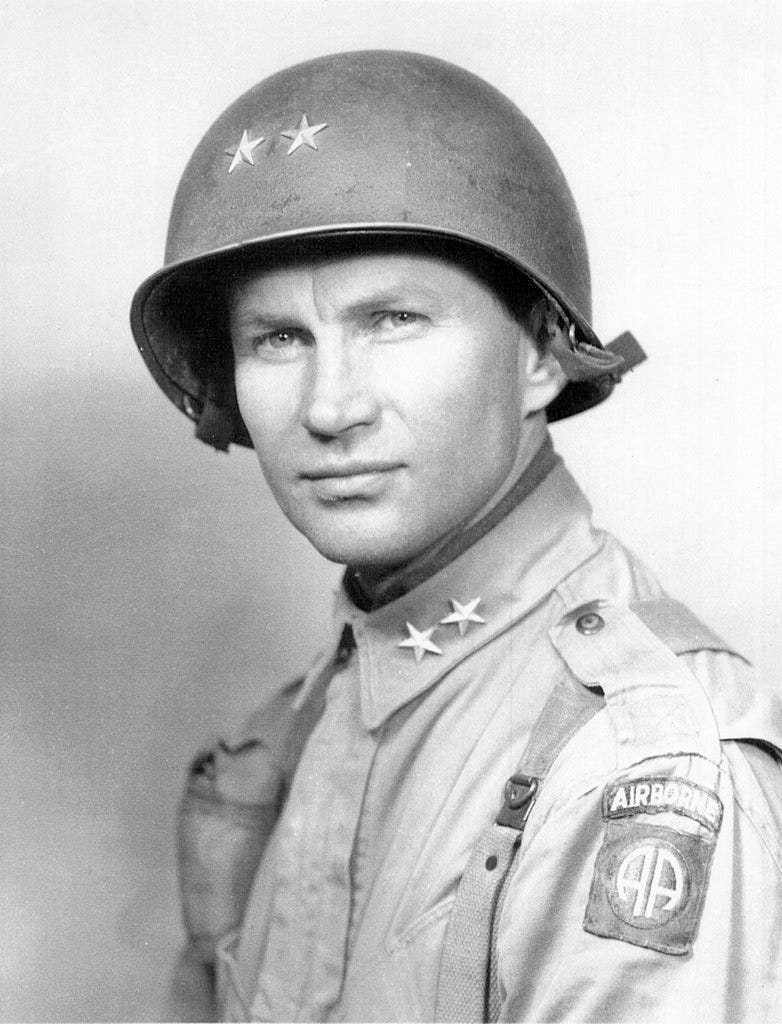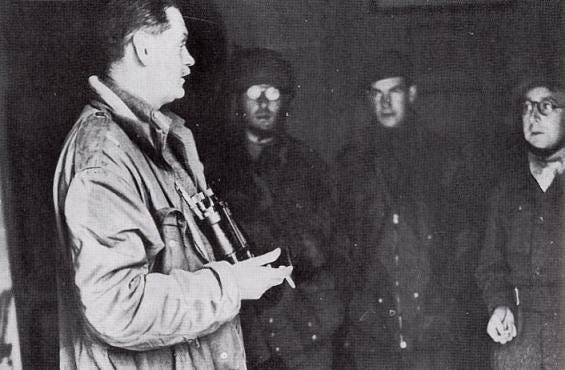D-Day: Behind enemy lines with a typewriter
Paratroopers from the 82nd and 101st Airborne divisions jumped with 125 to 150 pounds of equipment on D-Day, loaded down with whatever they might need to be self-sufficient until the linkup with seaborne troops or aerial resupply arrived.
Time correspondent William Walton didn't jump with a radio or machine gun components like some of his compatriots, but he did strap to his chest a bulky piece of gear suited to his personal invasion duties: a portable Hermes typewriter.
I plunged out of the plane door happy to be leaving a ship that was heading toward flak and more Germans. The jump was from such low altitude there was only a moment to look around in the moonlight after my chute opened. The fields looked so small that one couldn't miss a tree or hedge. Anyway, I couldn't.
Walton landed in a pear tree, his chute entangled in the upper branches while his boots swung a few feet off the ground. With his harness riding up, he couldn't access the small knife in his breast pocket, so he made himself as silent as he could and listened for friendly voices. He eventually heard some, in a nearby hedgerow, and called out in a stage whisper for help. One man finally responded, creeping to Gavin's side and cutting his parachute cords: "I dropped like an overripe pear."
It took me two seconds flat to struggle out of my harness and drag my typewriter-laden frame into the hedge. There were three of us there, moving through the shadows one by one. We picked up five more men in the next hour and a half. It was four in the morning before we joined the brigadier general, who headed our jump.
That would be 37-year-old Gen. James Gavin of the 82nd Airborne, who had been the first man out of Walton's plane a few hours earlier.
So began Walton's adventure in Normandy, which would merit a relatively brief item in the June 19 issue of Time. The piece concluded with Walton describing the scene on D + 3, June 9:
Nobody has had his boots off yet. Until yesterday we were surrounded, under constant fire. There will be more of it. But the beachhead forces have joined up with us and now the shells are going in the other direction. In the first 72 hours we had only three hours of sleep, wrapped in parachutes out in the open.
Now, however, Walton and the paratroopers sat in "an apple orchard in full bloom," eating rations supplemented by cognac and real, actual "shell eggs" liberated from a German headquarters building.
It would be lovely if you could ignore the shelling, the dirt, the burning fatigue.
While Walton was hardly the only correspondent who willingly exposed himself to danger in an effort to tease the best possible story out of the long-awaited invasion, he and the rest of his ilk who entered France with airborne troops arriving by parachute and glider incurred a unique set of dangers on and after D-Day.
Wrote Leonard Mosley of Kemsley Newspapers, who jumped with the British 6th Airborne:
This is one of those stories that will have to write itself, because I am too exhausted, excited and exhilarated to have any control over what goes down on this typewriter. I parachuted into Europe two minutes past 1 a.m. this morning, six-and-a-half hours before our seaborne forces began the full-blown invasion of Festung Europa, and I have seen, done and experienced a lot since then.
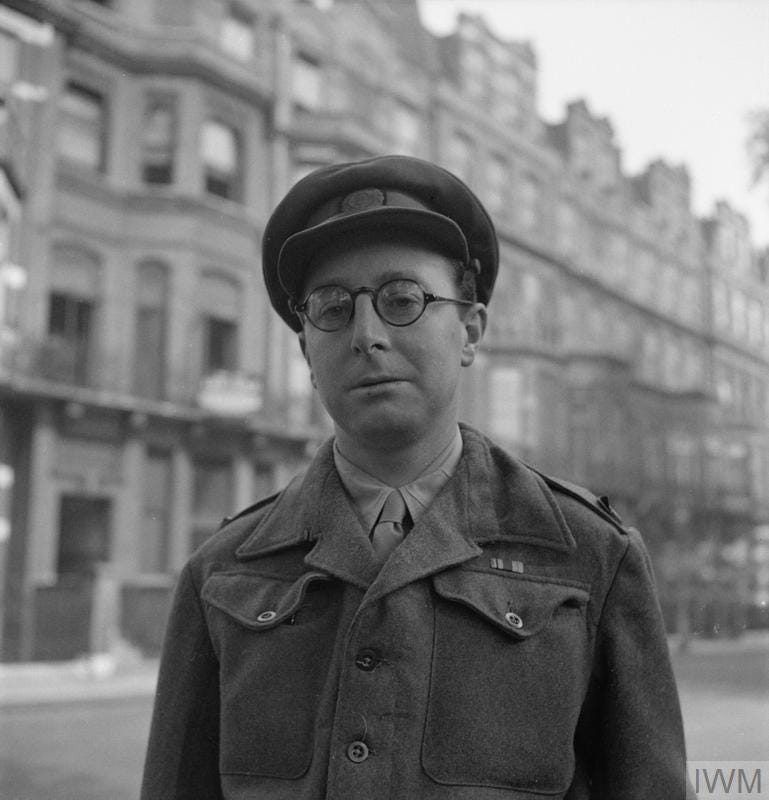
The 31-year-old, Manchester-born Mosley turned in a riveting, 2,000-word account that won the admiration of his peers. London-based Time reporter William Johnson cabled back to the home office in New York on June 8 saying Mosley's D-Day piece "is by far the most vivid eye-witness report published here thus far."
The story traced Mosley's progress, from boarding the bomber "C for Charlie" at a British airfield at 11:20 p.m. on June 5 through his harrowing landing in France and the tense moments and hours that followed as he worked his way toward the coast.
As dawn came I moved across country through Nazi patrols to get nearer to the coast. Wherever we moved there were traces of our airbourne invasion. Emptied containers, still burning their signal lights, were scattered in fields and orchards, wrecked gliders littered the ground, some of them splintered to matchwood. There were parachutes lying everywhere.
There was an earthshaking holocaust of noise. Approaching the coast under cover of naval ships the invasion barges were coming in and coming in firing. It was a terrific barrage that must have paralysed the defenses. Then ships began nudging towards the beaches and we shook each others' hands in the knowledge that the invasion, at long last, had begun.
Mosley's report wraps up shortly after 9 p.m. on June 6, with another fleet of gliders coming in to reinforce the airborne troops who had landed nearly 24 hours earlier. An unnamed general assures him that everything is going to plan, and Mosley concludes: "It still is, as I finish this dispatch. We are confident it will continue to go according to plan."
Like Walton with the 82nd, Robert Reuben of Reuters had the good fortune to be assigned to a transport carrying one of the invasion's key players, in his case Gen. Maxwell Taylor of the 101st Airborne.
In fact, Reuben preceded Taylor out of the door of their plane, just hours after the general had received a farewell pep talk from Gen. Dwight D. Eisenhower at a British airfield. Since then, the 25-year-old correspondent had fallen asleep on the ride over, only to be shaken awake by Maj. Larry Legere as they crossed the French coastline.
Mesmerized by tracer bullets in the air as he descended, Reuben had a smooth landing but struggled to escape his harness once on the ground, he wrote in a lengthy narrative printed in Liberty magazine in August 1944. Finally able to cut himself free with a trench knife, he stumbled through the countryside before finding a pair of comrades, who nearly shot him because he couldn't remember the password.
The paratroopers soon left him alone at an intersection so they could scout down one of the roads, and Reuben decided to try and figure out where he was, using his small map and compass.
I was poring over my compass when a shot zinged over my head. I darted through the hedge ... and into a hedge on the other side of the road. Slowly I worked my way ahead. It was deathly quiet again, and every bush held terror in the moonlight. Just as I got to the crossroads I heard someone coming down the pathway and jumped into a ditch again.
Suddenly, he was standing beside Gen. Taylor, who was holding down the fort while others attempted to round up stray paratroopers.
"Hello, Reuben," Taylor said with a smile. "Glad to see you."
A while later, Taylor and his staff had established a makeshift command post as they tried to get a handle on the situation. Reuben, exhausted, sat down against a tree.
We were in France! It was hard to believe. I patted the ground, very much thrilled and feeling somewhat smug. I wished the whole world could see me -- sitting in a field in France, surrounded by the enemy, but undetected. Soon, the world would know that the long-awaited invasion had begun this night.
Perhaps alone among his fellow correspondents jumping into France that evening, the BBC's Guy Byam was fully aware of what it meant to be in battle. In November 1940, Byam had been serving in the Royal Naval Volunteer Reserve aboard the HMS Jervis Bay when the ship went down after a German attack in the North Atlantic. He was one of 68 survivors among 254 men on board, but he lost the sight in one eye.
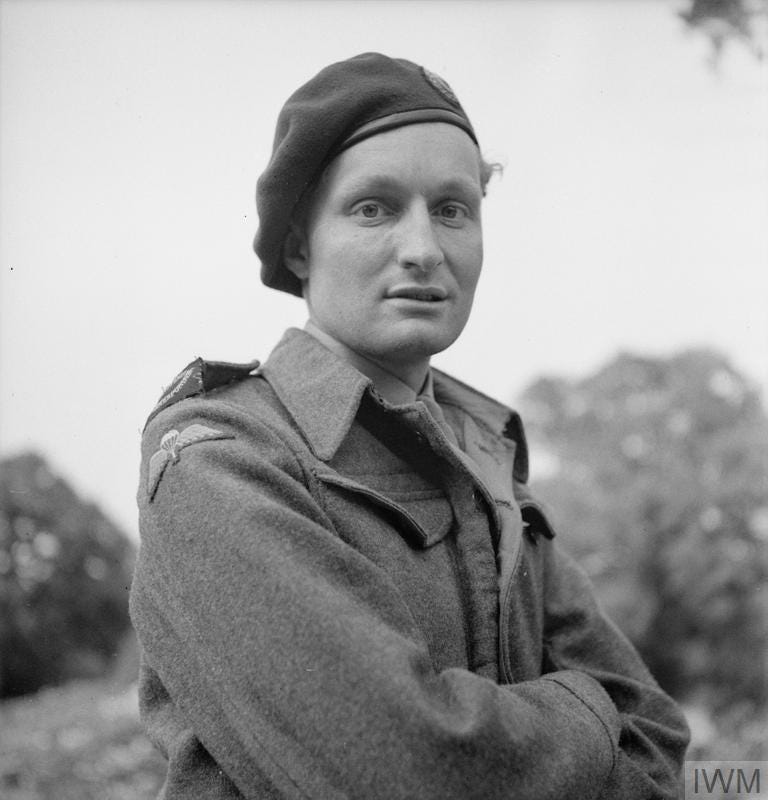
Byam joined the BBC two years later, and was assigned to the war reporting unit as the invasion neared. He jumped into Normandy with the 6th Airborne, and his report aired June 8 on the BBC's "War Report" program.
We're over the coast now and the run in has started -- one minute, thirty seconds, red light, green light, and out! Get on, get out, get out -- out fast into the cool night. Out, out, into the air over France.
Like the rest of these ad-hoc, noncombatant paratroopers, Byam somehow managed to make it through June 6 and the coming days unscathed. Of the parachute correspondents, only Phil Bucknell of Stars and Stripes, who suffered a broken lower leg on landing, would come up injured.
Byam's war would not have a happy ending, however. On February 3, 1945, the correspondent joined the crew of the Eighth Air Force B-17G Rose of York -- named for then-Princess, now-Queen Elizabeth -- on a raid to Berlin. The bomber was hit by flak over the target and never returned, disappearing into the North Sea.

